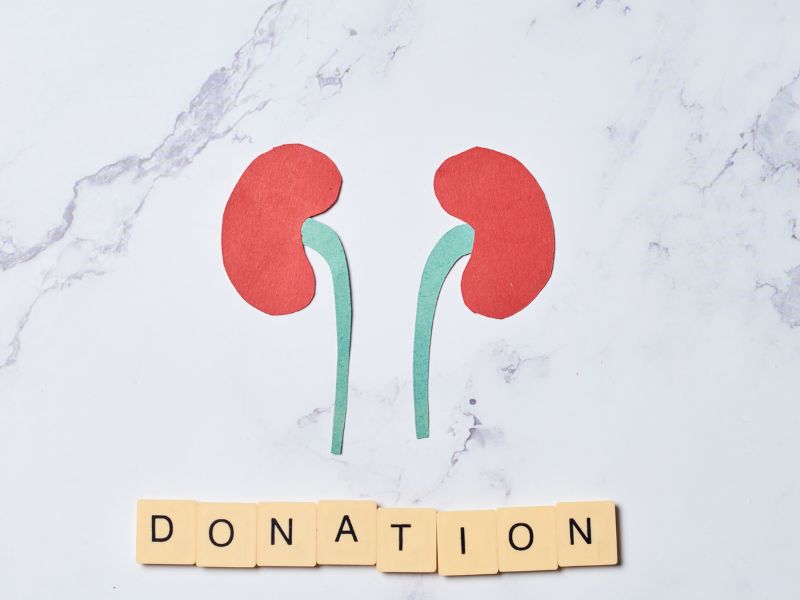Every day, someone is added to the organ transplant waiting list, and a large number of them are in urgent need of a kidney. But what if you could save a life by simply saying, “I want to donate my kidney” and becoming a kidney transplant donor?
With rising cases of kidney failure and limited donor availability, the demand for kidneys has grown rapidly. Requests like “kidney required,” “kidney needed,” or “kidney wanted” are now more common than ever across hospitals and kidney banks.
When someone needs care urgently, Refer a Patient for Medical Help without complications.
In this blog, we’ll walk you through everything you need to know, from who can donate and kidney donor eligibility to the kidney donation process, the role of kidney banks, and key legal and ethical considerations. Online donations in India are interfering with better health; it’s crucial to understand how raise fund online through platforms like ImpactGuru Foundation can help make kidney transplants more accessible and affordable.
Read More: Liver Transplant Waiting List: Registration & Criteria
Read More: Find Hospitals near you.
Table of Contents
- Who is a Kidney Transplant Donor?
- What important steps and criteria should someone in India know before deciding to become a kidney transplant donor?
- Kidney Transplant Donor Eligibility
- Kidney Donation Surgery: What to Expect?
- What is the Role of Kidney Banks ?
- What are the Legal and Ethical Considerations ?
- Conclusion
- FAQs
Who is a Kidney Transplant Donor?

You can raise money through crowdfunding by inviting others to be part of your mission.
With crowdfunding, you’re able to raise money while building shared purpose.
A kidney transplant donor is a person who voluntarily gives one of their healthy kidneys to someone suffering from kidney failure. Since humans can live with just one functioning kidney, this donation can save a life without harming the donor’s health.
What important steps and criteria should someone in India know before deciding to become a kidney transplant donor?
In India, becoming a kidney transplant donor involves meeting medical eligibility criteria, undergoing detailed health and psychological evaluations, and following legal approval processes set by transplant authorities. Donors must be physically fit, give informed consent, and complete required documentation to ensure the donation is ethical, safe, and legally valid for both the donor and the recipient
There are two types of kidney donors:
- Living Donor: A living donor is a healthy individual who donates one of their kidneys while they’re alive. This could be a family member, friend, or even a kind stranger, but it should not have any monetary benefit.
- Deceased Donor: A deceased donor is a person who had previously registered for kidney organ donation and donates after death. It is coordinated through national registries, organ banks, and transplant centers.
Reduce uncertainty in healthcare decisions—Explore Patient Care Guides for clarity.
Regardless of the type, every donor helps close the gap between patients in need and available organs. In many cases, families also turn to crowdfunding websites like Impact Guru to raise funds for transplant procedures, making life-saving treatments more accessible.
Read More: Benefits of Organ Donation: Criteria & Registration Process
Read More: Calculate the Cost of your Treatment.
Kidney Transplant Donor Eligibility
Not everyone is eligible to become a kidney transplant donor. To protect both the donor and recipient, strict medical and legal guidelines are followed. These ensure that the donation is safe, voluntary, and beneficial.
General Medical Criteria:
- Age between 18 and 65 years (this may vary slightly as per the centers)
- Physically and mentally healthy with normal kidney function
- No history of kidney disease, diabetes, uncontrolled blood pressure, or cancer
- No transmissible infections such as HIV or hepatitis
Compatibility Factors:
- Blood type compatibility with the recipient
- Tissue typing and crossmatch testing
- Psychological evaluation to confirm informed consent and readiness
Other Kidney Donor Requirements
- You must not be under pressure or coercion to donate. The donation process should be completely voluntary, with no monetary benefit of organ donation.
- If you’re donating anonymously or to someone unrelated, legal approval and ethical clearance from an authorized committee are mandatory.
- You’ll be informed of your rights, risks, and post-operative care to make a well-informed decision.
Compare potential medical expenses using the Disease Cost Calculator.
These requirements are in place to ensure the donor will continue to live a healthy life after the transplant, and the recipient receives a viable, functioning kidney.
For those considering body parts donation more broadly, you may also be interested in understanding the liver transplant donor criteria or learning about the benefits of organ donation. Even basic knowledge, like normal liver weight or liver size, plays a role in organ health assessments during donor evaluation.
Read More: Kidney Stone- Diagnosis, Causes, Treatment, & More

Kidney Donation Surgery: What to Expect?
Once you’re found eligible for kidney donation, the next step involves the surgical procedure. This process is carefully managed by a specialized team, which typically includes a transplant surgeon or urologist and an anesthesiologist.
- You’ll be put under general anesthesia to ensure you’re asleep and pain-free throughout the surgery.
- A Foley catheter is inserted to monitor your urine during and after the procedure.
- The surgeon usually performs a laparoscopic radical nephrectomy, where your kidney is removed through small incisions using a laparoscope, a thin tube with a camera.
- The laparoscopic method is preferred for its quicker recovery and minimal scarring.
- In rare cases, an open surgery may be required. This involves a single, larger incision to provide a clearer view for the surgeon. Less than 5% of surgeries are performed this way.
- The donated kidney is immediately transferred to the recipient, often located in a nearby operating room. The entire procedure usually takes 2–3 hours.
Simplify medical planning when you Find hospital and fund your treatment digitally.
Recovery After Surgery:
- Post-surgery, your incision sites are bandaged, and you’re monitored closely in a recovery room. Pain relief, IV fluids, and gradual food intake help you regain strength.
- Most donors are discharged in 2–3 days, but may feel fatigue and tenderness for a few weeks.
- You’ll need help at home for at least a week and regular follow-up appointments at 6, 12, and 24 months after donation. A nephrologist and your transplant team will guide your health checks.
While the procedure is safe and well-coordinated, it’s essential to be mentally and physically prepared. For those thinking “I want to donate my kidney,” knowing what lies ahead in the kidney donation process can make the decision more informed and confident.

What is the Role of Kidney Banks ?
Kidney banks play an important role in streamlining the kidney donation and transplant process. They act as organized systems that maintain a registry of kidney donors and recipients, matching them based on medical compatibility and urgency.
A kidney bank ensures that patients who need a kidney transplant donor can be matched with suitable donors efficiently and ethically. Just like with the liver transplant waiting list, where organ banks coordinate donor-recipient matching, kidney banks manage both living and deceased donor registrations, helping reduce the waiting time for patients in need.
They are also responsible for:
- Medical screening and data management of kidney donors
- Maintaining transplant waiting lists and prioritizing based on medical need
- Coordinating with hospitals and transplant centers for safe and timely transplants
- Raising awareness about kidney organ donation and encouraging voluntary registrations
For people searching phrases like “kidney required” or “kidney donor needed,” kidney banks are the first trusted point of contact. They bridge the gap between donors and those in urgent need of a transplant.
Additionally, kidney banks work closely with government bodies to ensure that all donations follow legal guidelines, protecting both donors and recipients. For those facing financial constraints during transplant procedures, an ethical crowdfunding platform in India, like Impact Guru, supports raising online donation India for the families in need.
What are the Legal and Ethical Considerations ?
Kidney donation in India is governed by strict legal and ethical guidelines to ensure transparency, consent, and safety. The Transplantation of Human Organs and Tissues Act (THOTA), 1994, lays down clear rules for who can donate a kidney and under what circumstances.
Only close relatives, such as a spouse, parents, siblings, or children, can donate a kidney without special approval. In cases of unrelated donors, special permission from an authorization committee is required to prevent illegal practices like kidney donation for money.
Here are key legal and ethical points to know:
- Commercial trade of organs is strictly prohibited
- All donors must give informed, written consent
- Medical and psychological evaluations are mandatory
- Deceased kidney donations must be certified through a brain death declaration
- Kidney transplant donor requirements must be fulfilled before approval
By following these legal and ethical standards, India aims to create a safe, respectful, and regulated environment for kidney organ donation.
Conclusion
Becoming a kidney transplant donor is a noble decision that can save a life. Whether you’re considering donation or need a kidney, understanding the eligibility, donation process, and legal guidelines is crucial. With rising awareness and support systems in place, crowdfunding platforms in India like ImpactGuru, more people can now access the care they need. If you’re confident enough to say, ‘I want to donate my kidney,’ after learning about the process and eligibility, taking the right steps can turn that intent into a powerful act of hope and healing.
FAQs
Any healthy adult (usually 18-65), with compatible blood type and kidney function, without serious medical conditions or infections.
Yes — non-related or emotionally related donors require clearance from the State Authorization Committee to ensure there’s no commercial transaction or coercion.
Tests include blood group matching, tissue typing (HLA), kidney function, viral markers (HIV, hepatitis), ECG, and imaging among others.
Documents such as identity proof, birth certificate/family tree, marriage certificate (if applicable), and sometimes affidavits or DNA reports to establish the relationship.
The transplant must get approval from a hospital’s transplant team and the State Authorization Committee after verifying medical suitability, donor consent, and relationship documentation.
The process involves medical and psychological evaluations, compatibility testing, legal clearance from an authorization committee, and the surgical procedure itself.
Yes, but it requires legal approval and ethical clearance from an authorized committee to ensure the donation is voluntary and not for monetary gain.












